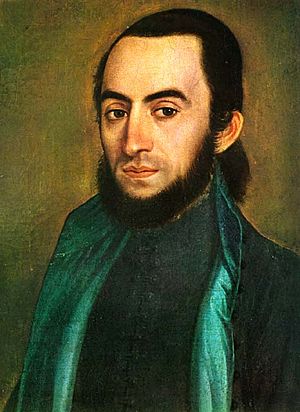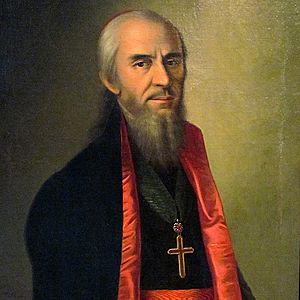Lukijan Mušicki facts for kids
Quick facts for kids
Luka Mušicki
|
|
|---|---|
 |
|
| Born |
Luka Mušicki
27 January 1777 |
| Died | 15 March 1837 (aged 60) Karlovac, Austrian Empire
|
| Occupation | Poet, archimandrite |
Lukijan Mušicki (born January 27, 1777 – died March 15, 1837) was a famous Serbian poet and writer. He was also a polyglot, meaning he spoke many languages. Later in his life, he became an important bishop in the Serbian Orthodox Church.
Contents
Lukijan Mušicki's Early Life and Education
Lukijan Mušicki was born as Luka Mušicki in Temerin on January 27, 1777. His parents made sure he received a good education from a young age. He went to different schools, including a Serbian school in Temerin and a German school in Titel.
He also attended high schools, called gymnasia, in Novi Sad and Szeged. After that, he studied philosophy and law at the University of Pest. Even though he studied law, his favorite subjects were always art and poetry.
Lukijan was influenced by many thinkers and poets. These included Edmund Burke and German poets like Karl Wilhelm Ramler. During this time, he also learned to speak Greek and English.
Becoming a Writer and Monk
After finishing school, Lukijan didn't have much money. He decided to focus on writing. In 1800, he published some of his poems in Serbian magazines. Some church leaders didn't like his poems at first. However, a very important Serbian language reformer, Vuk Karadžić, really liked his work. This led to a friendship between them.
From then on, Lukijan spent his life writing and studying literature. Soon after, he became a secretary for Metropolitan Stefan Stratimirović in Sremski Karlovci. Here, he was closely watched by church officials. They were worried because he spent his free time translating ancient Latin poets. He knew many of Horace's poems by heart.
In 1802, Lukijan decided to become a monk. He took new vows and changed his name to "Lukijan." After this, he was allowed to teach at the Theological Seminary in Karlovci. He wrote a lot about art and poetry. He became an important literary critic, but mostly outside of the monastery. In 1812, he became an archimandrite, which is a high rank for a monk, at the Šišatovac Monastery.
Later Life and Legacy
In 1828, when he was 51, Lukijan became a bishop. He was made the bishop of the Diocese of Upper Karlovci. He lived there for the rest of his life. He passed away in Sremski Karlovci on March 15, 1837, at the age of sixty.
Lukijan Mušicki is best known for his classical poetry. He also translated many works from the Latin poet Horace. Most of his other writings were like newspaper articles about literature. His poems are considered very important in Serbian literature from the 18th century. He was a pioneer, meaning he was one of the first to do certain things in writing.
His collected poems and writings were published after he died. They were called Lukijana Mušickog stihodvorenia. The first two books came out in Budapest in 1838 and 1840. Two more books were published in Novi Sad in 1844 and 1847.
Lukijan Mušicki's Lasting Impact
Lukijan Mušicki was born in Temerin. He became a monk and later the head of a monastery. His religious poems were written in Church Slavonic. This was a formal language used by the Serbian Orthodox Church. The church leaders liked and valued these poems.
However, he also wrote poems in the everyday language, called the vernacular tongue. The church leaders did not approve of these poems. They even threatened to remove him from his religious duties if he didn't stop. In the end, he did stop writing in the common language. Later, Vuk Karadžić helped make the everyday language accepted for writing.
Many people who lived at the same time as Lukijan thought he brought back the glory of the 18th century's classical style. Scholars like Pavel Jozef Šafárik called him the "Prince of Serbian Poetry." Petar I Petrović-Njegoš said he was "a genius of our race." Jernej Kopitar even called him "the Serbian Horace" because of his translations.
While these praises might be a bit strong, there's no doubt that Lukijan Mušicki is one of the most important Serbian poets of his time. He, along with other writers like Dositej Obradović, helped keep literature alive and passed on knowledge during their era.
 | Lonnie Johnson |
 | Granville Woods |
 | Lewis Howard Latimer |
 | James West |


